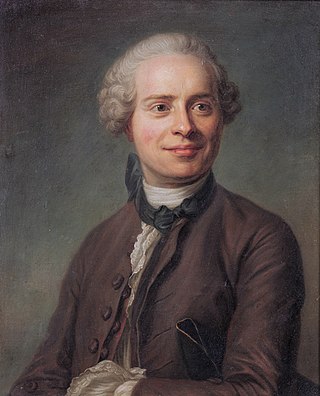
Denis Diderot was a French philosopher, art critic, and writer, best known for serving as co-founder, chief editor, and contributor to the Encyclopédie along with Jean le Rond d'Alembert. He was a prominent figure during the Age of Enlightenment.

Jean-Baptiste le Rond d'Alembert was a French mathematician, mechanician, physicist, philosopher, and music theorist. Until 1759 he was, together with Denis Diderot, a co-editor of the Encyclopédie. D'Alembert's formula for obtaining solutions to the wave equation is named after him. The wave equation is sometimes referred to as d'Alembert's equation, and the fundamental theorem of algebra is named after d'Alembert in French.
The following is a timeline of classical mechanics:

Encyclopédie, ou dictionnaire raisonné des sciences, des arts et des métiers, better known as Encyclopédie, was a general encyclopedia published in France between 1751 and 1772, with later supplements, revised editions, and translations. It had many writers, known as the Encyclopédistes. It was edited by Denis Diderot and, until 1759, co-edited by Jean le Rond d'Alembert.

D'Alembert's principle, also known as the Lagrange–d'Alembert principle, is a statement of the fundamental classical laws of motion. It is named after its discoverer, the French physicist and mathematician Jean le Rond d'Alembert, and Italian-French mathematician Joseph Louis Lagrange. D'Alembert's principle generalizes the principle of virtual work from static to dynamical systems by introducing forces of inertia which, when added to the applied forces in a system, result in dynamic equilibrium.
The Encyclopédistes were members of the Société des gens de lettres, a French writers' society, who contributed to the development of the Encyclopédie from June 1751 to December 1765 under the editors Denis Diderot and Jean le Rond d'Alembert, and only Diderot from 1765 to 1772.

The Gulf of Lion or Gulf of Lions is a wide embayment of the Mediterranean coastline of Catalonia in Spain with Languedoc-Roussillon and Provence in France, extending from Begur in the west to Toulon in the east.
In mechanics, virtual work arises in the application of the principle of least action to the study of forces and movement of a mechanical system. The work of a force acting on a particle as it moves along a displacement is different for different displacements. Among all the possible displacements that a particle may follow, called virtual displacements, one will minimize the action. This displacement is therefore the displacement followed by the particle according to the principle of least action.
The work of a force on a particle along a virtual displacement is known as the virtual work.

André François le Breton was a French publisher. He was one of the four publishers of the Encyclopédie of Diderot and d'Alembert, along with Michel-Antoine David, Laurent Durand, and Antoine-Claude Briasson. Le Breton contributed some articles to the Encyclopédie, but acted primarily as publisher and editor, often against Diderot's will.
The Preliminary Discourse to the Encyclopedia of Diderot is the primer to Denis Diderot's Encyclopédie ou Dictionnaire raisonné des sciences, des arts et des métiers, par une Société de Gens de lettres, a collaborative collection of all the known branches of the arts and sciences of the 18th century French Enlightenment. The Preliminary Discourse was written by Jean Le Rond d'Alembert to describe the structure of the articles included in the Encyclopédie and their philosophy, as well as to give the reader a strong background in the history behind the works of the learned men who contributed to what became the most profound circulation of the knowledge of the time.
Alembert and its variants may refer to:

Izeste is a commune in the Pyrénées-Atlantiques department and Nouvelle-Aquitaine region of south-western France.
D'Alembert's Dream is an ensemble of three philosophical dialogues authored by Denis Diderot in 1769, which first anonymously appeared in the Correspondance littéraire, philosophique et critique between August and November 1782, but was not published in its own right until 1830:
Nicolas Beauzée was a French linguist, author of Grammaire générale and one of the main contributors to the Encyclopédie of Denis Diderot and Jean-Baptiste le Rond d'Alembert on the topic of grammar. In 1772 he was named as the successor to Charles Pinot Duclos in the Académie française.

The Advancement of Learning is a 1605 book by Francis Bacon. It inspired the taxonomic structure of the highly influential Encyclopédie by Jean le Rond d'Alembert and Denis Diderot, and is credited by Bacon's biographer-essayist Catherine Drinker Bowen with being a pioneering essay in support of empirical philosophy.
D'Alembert may refer to:

Urena lobata, commonly known as Caesarweed or Congo jute, is a tender perennial, variable, erect, ascendant shrub or subshrub measuring up to 0.5 meters (1.6 ft) to 2.5 meters (8.2 ft) tall. The stems are covered with minute, star-like hairs and often tinged purple. Considered a weed, it is widely distributed in the tropics, including in Brazil and Southeast Asia.
Jean-Baptiste-Pierre Le Romain was a French engineer and contributor to the Encyclopédie during the eighteenth century and the Age of Enlightenment.
Events from the year 1751 in France.